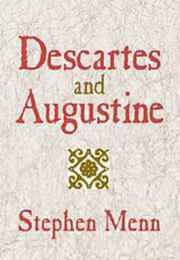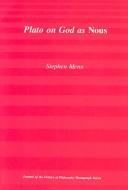| Listing 1 - 10 of 13 | << page >> |
Sort by
|

ISBN: 0521417023 0521012848 0511608993 9780521012843 9780511608995 9780521417020 Year: 2002 Publisher: Cambridge : Cambridge University Press,
Abstract | Keywords | Export | Availability | Bookmark
 Loading...
Loading...Choose an application
- Reference Manager
- EndNote
- RefWorks (Direct export to RefWorks)
This book is a systematic study of Descartes' relation to Augustine. It offers a complete reevaluation of Descartes' thought and as such will be of major importance to all historians of medieval, neo-Platonic, or early modern philosophy. Stephen Menn demonstrates that Descartes uses Augustine's central ideas as a point of departure for a critique of medieval Aristotelian physics, which he replaces with a new, mechanistic anti-Aristotelian physics. Special features of the book include a reading of the Meditations, a comprehensive historical and philosophical introduction to Augustine's thought, a detailed account of Plotinus, and a contextualization of Descartes' mature philosophical project which explores both the framework within which it evolved and the early writings, to show how the collapse of the early project drove Descartes to the writings of Augustine.
#GOSA:II.P.AU.4 --- #GOSA:V.Mod.DESC.M --- Augustine Saint, Bishop of Hippo --- -Descartes, Rene --- Influence --- Augustine, --- Descartes, René, --- Descartes, Renatus --- Cartesius, Renatus --- Avgustin, Blazhennyĭ, --- Augustinus, Aurelius, --- Augustyn, --- Augustin, --- Ughasṭīnūs, --- Agostino, --- Agustí, --- Augoustinos, --- Aurelius Augustinus, --- Augustinus, --- Agustín, --- Aurelio Agostino, --- Episkopos Ippōnos Augoustinos, --- Augoustinos Ipponos, --- Agostinho, --- Aurelli Augustini, --- Augustini, Aurelli, --- Aurelii Augustini, --- Augustini, Aurelii, --- Ōgostinos, --- Agostino, Aurelio, --- אוגוסטינוס הקדוש --- أغسطينوس، --- 奥古斯丁 --- Influence. --- Descartes, René --- Augustine --- Descartes, Renâe, - 1596-1650. --- Augustine, - Saint, Bishop of Hippo - Influence. --- Descartes, Renâe, - 1596-1650. - Meditationes de prima philosophia. --- Avgustin, --- Augustinus, Aurelius --- Agostinho --- Augustine of Hippo --- Augustine d'Hippone --- Agostino d'Ippona --- Augustin d'Hippone --- Augustinus Hipponensis, sanctus --- Sant'Agostino --- Augustinus van Hippo --- Aurelius Augustinus --- Aurelio Agostino --- 聖アウグスティヌス --- アウグスティヌス --- Arts and Humanities --- Philosophy --- Descartes, René,

ISBN: 0585029709 9780585029702 0809319705 9780809319701 Year: 1995 Publisher: Carbondale: Southern Illinois University Press,
Abstract | Keywords | Export | Availability | Bookmark
 Loading...
Loading...Choose an application
- Reference Manager
- EndNote
- RefWorks (Direct export to RefWorks)
This book is the first sustained modern investigation of Platoʹs theology. A central thesis of the book is that Plato had a theology -- not just a mythology for the ideal city, not just the theory of forms or the theory of cosmic souls, but also, irreducible to any of these, an account of God as Nous (Reason), the source of rational order both to souls and the world of bodies. The understanding of God as Reason, and of the world as governed directly or indirectly by Reason, is worked out in the dialogues of Platoʹs last period, the Statesman, Philebus, Timaeus, and Laws. These dialogues offer a strategy for explaining the physical world that goes beyond anything in the middle dialogues, and gives the best starting point for understanding the cosmologies and theologies of Aristotle, the Stoics, and later ancient thinkers. -- Back cover.
God --- Noos (The Greek word) --- Philosophy & Religion --- Philosophy --- Nous (The Greek word) --- Greek language --- History of doctrines. --- History of doctrines --- Etymology --- Plato --- Platon --- Aflāṭūn --- Aplaton --- Bolatu --- Platonas --- Platone --- Po-la-tʻu --- Pʻŭllatʻo --- Pʻŭllatʻon --- Pʻuratʻon --- Πλάτων --- אפלטון --- פלאטא --- פלאטאן --- פלאטו --- أفلاطون --- 柏拉圖 --- 플라톤 --- Платон --- プラトン --- Contributions in concept of God. --- Contributions in concept of Nous. --- Religion. --- God - History of doctrines
Article
Abstract | Keywords | Export | Availability | Bookmark
 Loading...
Loading...Choose an application
- Reference Manager
- EndNote
- RefWorks (Direct export to RefWorks)
Book
ISBN: 9781350285682 1350285684 9781350285729 1350285722 9781350285712 9781350285699 9781350285705 1350285714 1350285692 1350285706 Year: 2024 Publisher: London Bloomsbury Academic
Abstract | Keywords | Export | Availability | Bookmark
 Loading...
Loading...Choose an application
- Reference Manager
- EndNote
- RefWorks (Direct export to RefWorks)
With this translation, all 12 volumes of translation of Simplicius' commentary on Aristotle's Physics have been published (full list below). In Physics 1.1–2, Aristotle raises the question of the number and character of the first principles of nature and feels the need to oppose the challenge of the paradoxical Eleatic philosophers who had denied that there could be more than one unchanging thing. This volume, part of the groundbreaking Ancient Commentators on Aristotle series, translates into English for the first time Simplicius' commentary on this selected text, and includes a brief introduction, extensive explanatory notes, indexes and a bibliography.
Aristote --- Physics --- Philosophy of nature --- Physics. --- Aristotle. --- Physics (Aristotle) --- Western philosophy: Ancient, to c 500 --- Classical texts --- Aristotle
Book
ISBN: 9781350286627 9781350286665 1350286621 135028663X 1350286648 1350286664 1350286656 9781350286658 9781350286634 9781350286641 Year: 2024 Publisher: London Bloomsbury Academic
Abstract | Keywords | Export | Availability | Bookmark
 Loading...
Loading...Choose an application
- Reference Manager
- EndNote
- RefWorks (Direct export to RefWorks)
Supporting the twelve volumes of translation of Simplicius' great commentary on Aristotle's Physics, all published by Bloomsbury in the Ancient Commentators on Aristotle series, between 1992 and 2021, this volume presents a general introduction to the commentary. It covers the philosophical aims of Simplicius' commentaries on the Physics and the related text On the Heaven ; Simplicius' methods and his use of earlier sources; and key themes and comparison with Philoponus' commentary on the same text. Simplicius treats the Physics as a universal study of the principles of all natural things underlying the account of the cosmos in On the Heaven. In both treatises, he responds at every stage to the now lost Peripatetic commentaries of Alexander of Aphrodisias, which set Aristotle in opposition to Plato and to earlier thinkers such as Parmenides, Empedocles and Anaxagoras. On each passage, Simplicius after going through Alexander's commentary raises difficulties for the text of Aristotle as interpreted by Alexander. Then, after making observations about details of the text, and often going back to a direct reading of the older philosophers (for whom he is now often our main source, as he is for Alexander's commentary), he proposes his own solution to the difficulties, introduced with a modest 'perhaps', which reads Aristotle as in harmony with Plato and earlier thinkers.
Aristote --- Simplicius, --- Aristotle. --- Physics (Aristotle) --- Physics --- Science, Ancient. --- Western philosophy: Ancient, to c 500 --- Classical texts --- Ancient science --- Science, Primitive --- Science --- History --- Aristoteles. --- Science, Ancient --- Philosophy of nature --- Aristotle
Book
ISBN: 9780197501627 0197501621 Year: 2020 Publisher: New York (N.Y.) : Oxford university press,
Abstract | Keywords | Export | Availability | Bookmark
 Loading...
Loading...Choose an application
- Reference Manager
- EndNote
- RefWorks (Direct export to RefWorks)
"Anton Wilhelm Amo (c. 1703 - after 1752) is the first modern African philosopher to study and teach in a European university and write in the European philosophical tradition. We give an extensive historical and philosophical introduction to Amo's life and work, and provide Latin texts, with facing translations and explanatory notes, of Amo's two philosophical dissertations, On the Impassivity of the Human Mind and the Philosophical Disputation containing a Distinct Idea of those Things that Pertain either to the Mind or to our Living and Organic Body, both published in 1734. The Impassivity is an extended argument that the mind cannot be acted on, that sensation is a being-acted-on by the sensed object, and therefore that sensation does not belong to the mind, and must belong instead to the body The Distinct Idea works out the implications for the mind's actions, and tries to show how the mind understands, wills, and effects things through the body by 'intentions' which direct motions in our body intentionally toward external things. Both dissertations try to show how far each type of human act belongs to the mind, how far to the body, and expose and resolve earlier philosophers' self-contradictions on these questions"--
Digital

ISBN: 9783110276381 9783110276350 Year: 2013 Publisher: Berlin ;; Boston De Gruyter
Abstract | Keywords | Export | Availability | Bookmark
 Loading...
Loading...Choose an application
- Reference Manager
- EndNote
- RefWorks (Direct export to RefWorks)
Book

ISBN: 3110215764 9783110215762 1306968259 9781306968256 3110215756 9783110215755 9783110215755 Year: 2011 Publisher: Berlin Boston
Abstract | Keywords | Export | Availability | Bookmark
 Loading...
Loading...Choose an application
- Reference Manager
- EndNote
- RefWorks (Direct export to RefWorks)
Avicenna's Metaphysics (in Arabic: Ilâhiyyât) is the most important and influential metaphysical treatise of classical and medieval times after Aristotle. This volume presents studies on its direct and indirect influence in Arabic, Hebrew, and Latin culture from the time of its composition in the early eleventh century until the sixteenth century. Among the philosophical topics which receive particular attention are the distinction between essence and existence, the theory of universals, the concept of God as the necessary being and the theory of emanation. It is shown how authors such as Averroes, Abraham ibn Daud, Albertus Magnus, Thomas Aquinas and John Duns Scotus react to Avicenna's metaphysical theories. The studies also address the philological and historical circumstances of the textual tradition in three different medieval cultures. The studies are written by a distinguished international team of contributors, who convened in 2008 to discuss their research in the Villa Vigoni, Italy.
Metaphysics. --- Islamic philosophy. --- Jewish philosophy. --- Philosophy, Medieval. --- Medieval philosophy --- Scholasticism --- Jews --- Philosophy, Jewish --- Philosophy, Israeli --- Arabic philosophy --- Muslim philosophy --- Philosophy, Islamic --- Philosophy, Arab --- Philosophy --- God --- Ontology --- Philosophy of mind --- Avicenna, --- Avicenna. --- Literary Reception.
Digital

ISBN: 9783110215762 9783110215755 Year: 2011 Publisher: Berlin ;; Boston De Gruyter
Abstract | Keywords | Export | Availability | Bookmark
 Loading...
Loading...Choose an application
- Reference Manager
- EndNote
- RefWorks (Direct export to RefWorks)
Book

ISBN: 9781463234973 Year: 2012 Publisher: Piscataway, NJ
Abstract | Keywords | Export | Availability | Bookmark
 Loading...
Loading...Choose an application
- Reference Manager
- EndNote
- RefWorks (Direct export to RefWorks)
| Listing 1 - 10 of 13 | << page >> |
Sort by
|

 Search
Search Feedback
Feedback About UniCat
About UniCat  Help
Help News
News